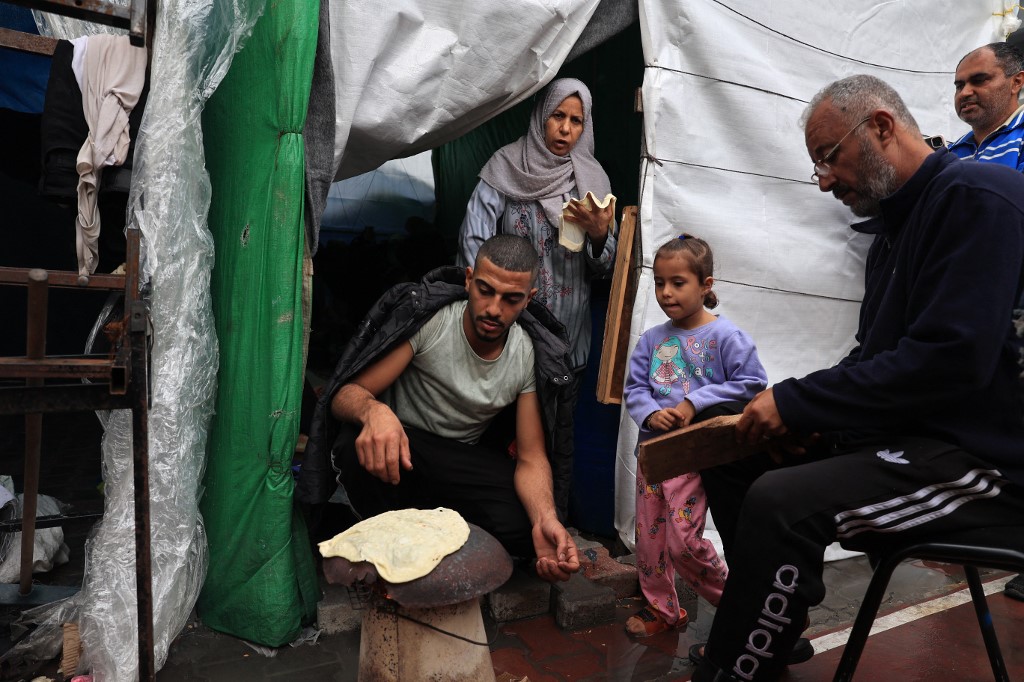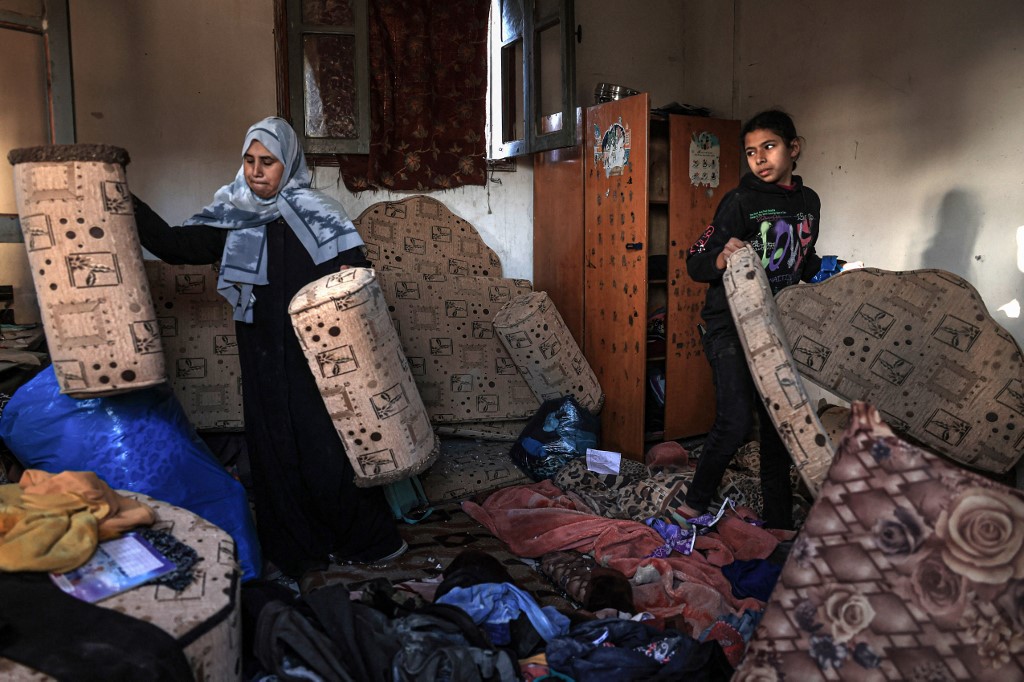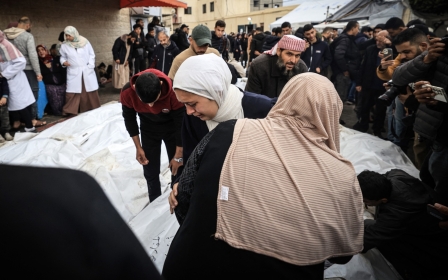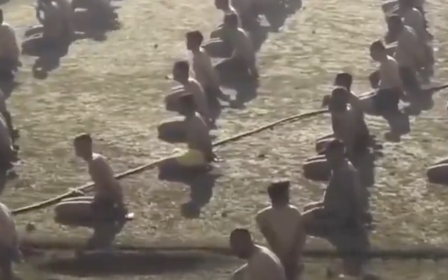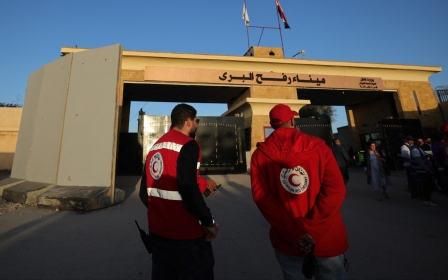War on Gaza: Displaced Palestinians wary of epidemics
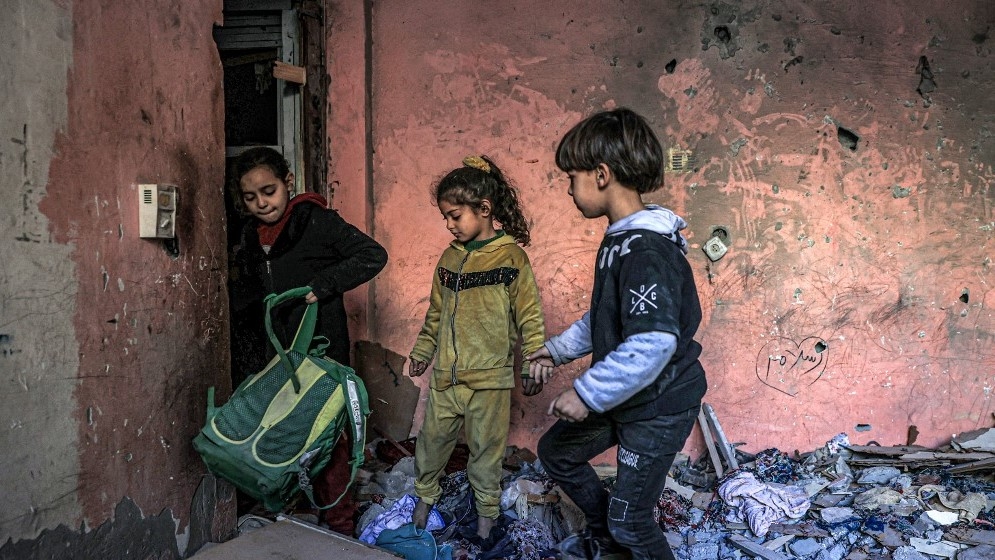
Reem Abu Daqqa and her family have been sheltering at the European Hospital in southern Gaza for more than two months to escape Israeli bombardment.
Like 85 percent of Gaza's 2.4 million population who have been forcibly displaced since the Israeli war on Gaza in the aftermath of the 7 October Hamas-led attacks, Abu Daqqa has nowhere else to go.
The 45-year-old had been a resident of the town of Abasan Al Kabira, east of Khan Younis, the southern city that has become the latest centre of urban combat between Israeli troops and Palestinian armed groups.
With the ongoing Israeli air strikes on residential areas, many of her family members have been wounded. They were forced to split into two groups, some sought shelter at Nasser Hospital, while others ended up at the European Hospital.
Speaking to Middle East Eye, Abu Daqqa described the makeshift accommodation within the hospital premises.
New MEE newsletter: Jerusalem Dispatch
Sign up to get the latest insights and analysis on Israel-Palestine, alongside Turkey Unpacked and other MEE newsletters
"We found ourselves with no alternative but to set up tents made from nylon and patient bed covers,” she said, adding that the overcrowded place is also marred by the absence of continuous water supply, hampering their ability to maintain hygiene, leading to the spread of diseases.
"Fires are lit using cloth and shoes, exacerbating pollution and health hazards,” she said.
Abu Daqqa added that children are particularly vulnerable, with cases of gastroenteritis emerging due to the polluted environment. Insufficient water for bathing and the prolonged waiting times for bathroom access - sometimes up to an hour - compound their suffering.
On Wednesday, the Palestinian health ministry said the death toll from Israel's operation had surpassed 21,000, most of them women and children. Herzi Halevi, the head of the Israeli armed forces, on Tuesday said the hostilities will continue for "many more months".
At least 1.9 million Palestinians have been internally displaced since the beginning of the Gaza assault, according to UN estimates. Only limited amounts of aid have been allowed to enter Gaza since the beginning of the war as Israeli has imposed a total blockade on the strip, including cutting off water and electricity supplies, causing severe shortages of water, fuel, food and medicines.
Follow Middle East Eye's live coverage of the Gaza war
Abu Daqqa drew further attention to the unsanitary conditions within the European Hospital, highlighting that children are forced to sit amid piles of garbage, intensifying pollution and leading to the spread of skin diseases. Seeking medical assistance becomes a futile effort as there is a shortage of medicines and ointments, she explained.
Furthermore, cooking food over fires fuelled by toxic materials like nylon bags and shoes puts their health at risk, according to Abu Daqqa.
"For over two months, we have been deprived of healthy food in refugee centres. Unfortunately, our plight is exacerbated by the lack of safe havens in the Gaza Strip, with all areas being prone to assaults from Israeli planes and tanks."
In a tent adjacent to Abu Daqqa, 35-year-old Rawan Al-Sayed said that since the onset of the war, her three children have been unable to recover from illness exacerbated by the severe cold, weakened immunity and insufficient food.
While she used to diligently prepare three meals a day for her children, the current circumstances make even providing a single meal a daunting task. Moreover, the lack of water to wash their hands increases the risk of contamination.
“To safeguard myself, I navigate the hospital wearing a mask. What if I fall ill? Who will care for my children?"
Al-Sayed recounts that she and her family have been displaced twice since the beginning of the Israeli onslaught. First, they left the Jabalia camp to the southern city of Khan Younis; then they were displaced once again to the European Hospital.
'Some of my children struggle with breathing problems and pneumonia, yet I feel helpless'
- Rawan al-Sayed, displaced mother
“The situation is tragic. We rely on meagre daily rations, and the children endure hunger, waking up with stomach pain every day, their colic intensified by the cold," she told MEE.
Like Abu Daqqa, al-Sayed is worried about the adverse effects of makeshift heating methods, which cause noxious fumes emanating from fires fuelled by shoes, empty plastic bottles and nylon.
“Some of my children struggle with breathing problems and pneumonia, yet I feel helpless,” she said.
At the hospital gate, many women light fires to bake bread on the unclean, polluted sand, contributing to the proliferation of diseases and epidemics, she said.
'Collective punishment'
In the Unrwa school next to the European Hospital, Samira Al-Louh, displaced from the Shujaiya camp, paints an equally harsh picture.
Each floor within the school accommodates more than 200 displaced people, with only two bathrooms available, the 55-year-old told MEE. But these bathrooms are far from clean, lacking water and proper hygiene. The overcrowding, she said, raises concerns about the potential outbreak of diseases among the residents there.
In addition to the unsanitary conditions, the displaced people are also facing the constant threat of air strikes.
Gastrointestinal diseases have taken hold and the extreme cold, she added.
“My five grandchildren, the youngest being just a year old, are not exempt from falling ill. We have been battling sickness for over a week, a consequence of polluted water and the inadequate living conditions,” she said.
"What kind of collective punishment is this? We endure a scarcity of water, a lack of food, absence of safety, and an overall absence of life,” she added.
Dr Youssef Al-Akkad, director of the European Hospital, said his medical team has documented numerous cases of hepatitis, smallpox, and skin diseases, a consequence of the substantial number of displaced individuals both within the hospital and in the surrounding schools.
The hospital corridors, department gates, and garden are teeming with thousands of displaced people, placing an immense burden on the facility, he told MEE.
The absence of water and proper hygiene, he explained, contributes to the proliferation of epidemics and skin diseases, further compounded by the insufficient treatment available for those affected by Israeli bombings.
“The hospital is under significant strain due to the surge in wounded cases, prompting us to open a nearby school to accommodate moderately and mildly wounded individuals,” he said.
'Beyond genocide'
The conflict in Gaza was triggered by the 7 October incursion by Hamas-led Palestinian fighters into southern Israel, which killed 1,140 people, mostly civilians, according to the Israeli army. During the operation, around 250 people were taken to Gaza as captives, of whom 129 remain in Gaza after a series of prisoner exchanges.
The subsequent Israeli operation, initially limited to aerial bombardment and then a full ground operation, has killed 21,110 mostly Palestinian civilians and wounded 55,000, according to the Palestinian health ministry.
Last week, Paula Gaviria Betancur, the UN's special rapporteur on the human rights of internally displaced persons (IDPs), warned that Israel is seeking to permanently alter the composition of Gaza’s population through constant evacuation orders and widespread and systematic attacks on civilians and civilian infrastructure in southern areas, initially designated as safe zones.
“Israel has reneged on promises of safety made to those who complied with its order to evacuate northern Gaza two months ago. Now, they have been forcibly displaced again, alongside the population of southern Gaza,” she said.
“Where will the people of Gaza have left to go tomorrow?”
Palestinian President Mahmud Abbas said on Tuesday that the current Israeli operation "goes beyond a Nakba and a genocide".
He said the crisis is much worse than the mass displacement of Palestinians in the 1948 war that led to the creation of Israel.
"Netanyahu's plan is to get rid of the Palestinians and the Palestinian Authority," he told Egyptian television in an interview.
Middle East Eye delivers independent and unrivalled coverage and analysis of the Middle East, North Africa and beyond. To learn more about republishing this content and the associated fees, please fill out this form. More about MEE can be found here.


